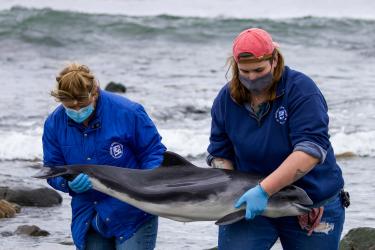Ecosystem modeling for living marine resource (LMR) management includes a range of qualitative and quantitative representations of part or all of an ecosystem. These are usually focused on a single LMR, aggregate groups of LMRs, or whole food webs with focal LMRs and the relevant biophysical and socioeconomic context. The tools may be something as simple as statistical models showing the correlations between a particular fish species and its habitat, or they may be as complex as end-to-end models that incorporate oceanographic model output and interactions between fished species, fisheries, protected resources and humans. They are key tools for supporting ecosystem-based fisheries management.
The primary reason to use ecosystem modeling is to establish a transparent connection between single species and ecosystem-based advice in a stock assessment, climate impacts, habitat review, or Integrated Ecosystem Assessment context. Ecosystem Models are used as operating models for Management Strategy Evaluation and skill assessment. They are used alongside other resource management models for multiple model inference to deal with scientific uncertainty and bias in models. They are integral tools for ecosystem-based risk assessment and trade-off evaluation in a bioeconomic context. Our Science Centers have developed a wide array of ecosystem models and applied them to many resource management issues.
Ecosystem modeling efforts at NOAA Fisheries science centers
Ecosystem Tools
NOAA Fisheries works in a wide variety of ecosystems, and though those systems differ greatly in the living resources, protected species, and habitats within them, we have a common set of modeling tools to analyze data for those systems and major interactions between ecosystem components. We have developed the Fisheries Integrated Toolbox and Ecosystem Tools through collaboration among our science centers and partners. These tools help to turn copious data from monitoring and research into assessments and other actionable information.
Successfully managing and recovering marine species requires us to understand the entire ecosystem and the suite of impacts on species’ survival, rather than considering just one species at a time. NOAA Fisheries is using sophisticated ecosystem modeling tools, coupled with input from stakeholders, to explore the tradeoffs inherent in natural resource management decisions. The models incorporate classic population biology and a range of climate, environmental, ecological and human impacts to the ocean. These models, which are relied on by our scientists and managers, provide essential data for making well informed decisions. However, the complexity that makes the models robust can also limit the ability of many audiences to understand and use the information provided. The underlying dynamics of these models are complex, and a new tool aims to show the results of those dynamics in an easy-to-view manner. We have developed videos and visualization tools to help stakeholders understand and engage in ecosystem-based fisheries management issues and models.
Learn more about U.S. ecosystems
Ecosystem Modeling Workshops
NOAA Fisheries has a wide range of major legislative mandates that require a movement towards many levels of ecosystem-based management. NOAA’s mission, vision, and policy statements promote movement towards ecosystem-based management. Ecosystem models are often required to understand the interactions among the living marine resources addressed in these mandates. Our modelers around the country hold regular National Ecosystem Modeling Workshops to stimulate and advance the use of ecosystem models to ensure the best available science is developed and applied towards ecosystem approaches to management.

